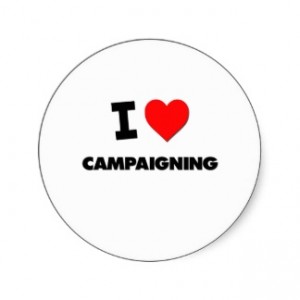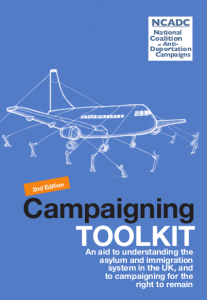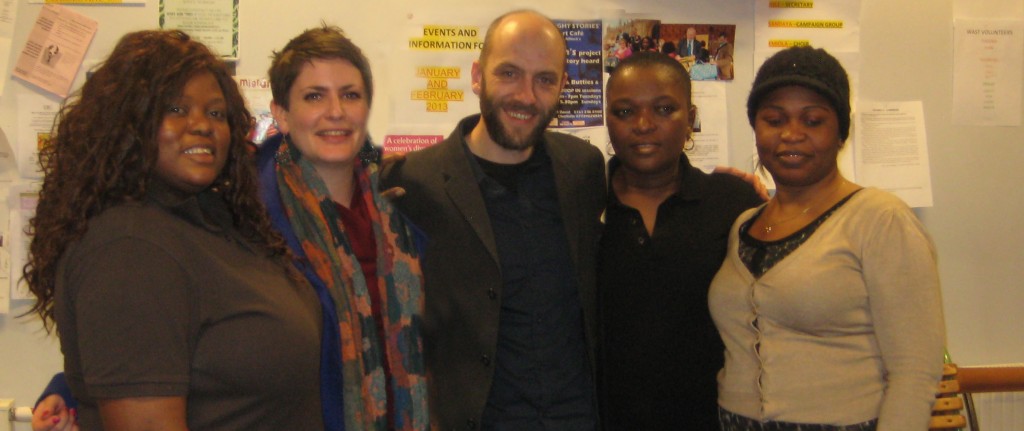NCADC is a national human rights organisation, founded in 1995, which supports community-led campaigns for justice in the asylum and immigration system, with a focus on supporting people’s campaigns for their right to remain.
NCADC provides free and confidential advice, resources and training on campaigning to stay in the UK, to individuals and groups. We advise on the benefits and risks, campaign strategies, non-public campaigning options, and we help promote public campaigns. We do not provide legal advice, or run campaigns for people. Instead, we provide individuals and groups with information about campaigning, tools to get a campaign started, advice and support along the way, and signposting to other sources of help.
What is campaigning?
 We have a very broad definition of campaigning.
We have a very broad definition of campaigning.
Immigration and asylum applicants face significant legal and procedural barriers to securing their right to remain. A campaign is a series of actions taken to overcome these barriers. It can be very public or relatively private, and includes practical assistance, advocacy, help with the legal process and more. Campaign actions can be things like providing moral support, writing letters, meeting with your local MP or organising a fundraising event.
Some campaign actions can be included in a public or a private campaign, for example airline campaigning. Some actions are clearly public, such as a solidarity rally in the streets of your local town.
The most effective campaigns are those that bring a diverse range of people together for a common cause, people with different experiences and campaigning strategies.
You can read more about the different types of campaigning in our toolkit.
Why campaign for individuals?
NCADC is not alone in believing that the UK immigration and asylum system is riddled with injustice. The asylum system in particular, with its culture of disbelief, leading to “perverse and unjust decisions” falls “seriously below the standards to be expected of a humane and civilised society” (Independent Asylum Commission).
We support campaigning in individual cases because it works: it can overcome the barriers to justice, and win the right to remain; and it can produce other benefits for the individual and the wider community too.
We repeatedly witness the positive impact of an individual or family taking some control back over their situation, by campaigning for the right to remain. Campaigners feel empowered by speaking out and bearing witness to injustice, by feeling the support of those around them, their community, and wider supporters of a campaign who they may never meet.
 The asylum and immigration system does not place a high value on the voices of migrants: on the contrary, it is a system that at times silences, at others twists the words of applicants in order to refuse their cases and categorise them as incredible. Individual campaigning is an opportunity for asylum seekers and other migrants to control their own story.
The asylum and immigration system does not place a high value on the voices of migrants: on the contrary, it is a system that at times silences, at others twists the words of applicants in order to refuse their cases and categorise them as incredible. Individual campaigning is an opportunity for asylum seekers and other migrants to control their own story.
Receiving a positive decision in an asylum or immigration application is rarely straight-forward, or quick. Persevering in the fight for justice in one’s case requires enormous emotional reserves, which we have seen replenished by the support of a campaign group.
With a broken asylum system, and so many people unrepresented or poorly represented in their legal cases, there are many people in need of support and community action to increase their chances of their legal case being recognised.
Broader benefits of individual campaigning
In addition to the benefits of campaigning for justice to the individual at the centre of the campaign, we believe in individual campaigning because of its broader impact as well. The campaign group or community that supports an individual in the campaign can gain strength from coming together for a common cause. They may learn skills and lessons that will make them better placed to campaign successfully the next time, irrespective of the outcome of the current campaign. The networking process of a campaign can help to build bonds and links within and between communities.
Individual campaigns are also a unique insight in to the injustices of the asylum and immigration system in the UK, and human rights abuses abroad. The breaking down of stereotypes and abstracts to individual human stories is a key weapon against anti-immigrant rhetoric, and helps to explain the human impact of unjust policies.
The ethics of individual campaigning
Campaigning for the right to remain means people coming together to take action for justice.
 Our campaigning toolkit explores the benefits to be gained from campaigning; how campaigning fits in with the legal process; the risks of campaigning; and how to campaign effectively.
Our campaigning toolkit explores the benefits to be gained from campaigning; how campaigning fits in with the legal process; the risks of campaigning; and how to campaign effectively.
A vital consideration is whether someone deciding to go public with their story has fully considered, and understood, the risks of public campaigning. The decision to go to public must involve weighing up the risks of publicity against the benefits of the reach a public campaign has. Read more in our toolkit.
It is very important that campaigning is ethical and reflective: making sure that the person fighting for justice in their case is at the centre of decision-making, and that we heard their words, their story. The needs of the individual seeking the right to remain always take priority over broader issues or political agendas.
Action for change
If you’re asking ‘why does campaigning matter?’ or ‘does campaigning work?’ you need to think about what you want to achieve from a campaign. Often campaigning is about raising awareness, but this is usually done to try and effect change. You want to tell people about something, and ask them to take some kind of action that will change the situation.
We’ve realised that one of the hardest things to do is to figure out EXACTLY what you want to achieve from campaign actions. Meaning:
- how do you get from launching a public campaign to someone winning the right to remain? A campaign is not a single action. What steps do you need to take? What will each step achieve?
- If you’re asking people to – for example - write to the Home Secretary, why are you asking them to do this? What are you hoping - exactly - will happen?
It might sound simple – we know what we want to achieve: winning the right to remain. We know what kind of actions to do, so lets do them! Now! But each action takes up precious time, so you need to pause and think what you really need to achieve right now.
- motivations for campaigning: why is the person at the centre of the campaign wanting to campaign? If you are in a support group, what motivates you to get involved?
- campaign actions: the things a campaign group does, or asks broader supporters to do
- desired outcomes from actions: if you’re taking a certain action, what are you wanting to happen?
- benefits from campaigning: the goal is the right to remain but there might be benefits for the individual at risk of removal, for other people in their situation, for the community as a whole.
These can difficult things to get your head around - many of the benefits of campaigning for the right to remain are indirect and hard to quantify. But it’s worth it! When you are in the middle of a campaign, you can lose sight of the bigger picture or lose heart. A campaign needs to be taken step by step. Celebrate the small victories and then start planning the next move.
And remember, NCADC is here to support you in your campaign. We can run training sessions for support groups and campaigning networks, give tailored advice throughout a campaign, and can also send you copies of our lovely newly-published campaigning tookit (second edition).
Contact NCADC about training workshops and hard copies of our toolkit
Read our toolkit online
Contact NCADC for campaign advice
Publicise your campaign on our Right to Remain website

